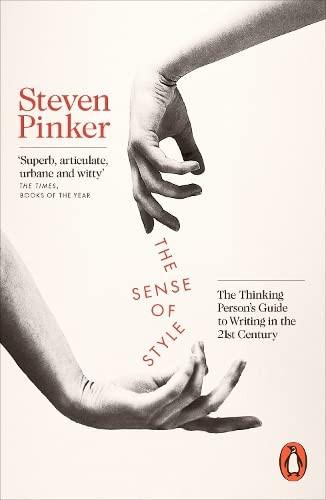S. Sybil's Key Ideas from The Sense of Style
by Steven Pinker
Ideas, facts & insights covering these topics:
13 ideas
·3.97K reads
23
1
Explore the World's Best Ideas
Join today and uncover 100+ curated journeys from 50+ topics. Unlock access to our mobile app with extensive features.
1. Signposting
This refers to the habit of saying what you’re going to say, saying it, and then saying what you’ve said.
One way to introduce a topic without signposting is to open with a question. Observe the following example:
This chapter discusses the factors that cause names to rise and fall in popularity.
vs.
What makes a name rise and fall in popularity?
The art of classic prose is to signpost sparingly, as we do in conversation, and with a minimum of metadiscourse.
53
648 reads
2. Focusing On The Profession Instead Of The Subject
Writers live in two universes. One is the world of the thing they study. The other is the world of their profession. Most of a researcher’s waking hours are spent in the second world, and it’s easy for him to confuse the two.
Example:
In recent years, an increasing number of psychologists and linguists have turned their attention to the problem of child language acquisition. In this article, recent research on this process will be reviewed.
vs.
All children acquire the ability to speak a language without explicit lessons. How do they accomplish this feat?
48
432 reads
3. Misusing Quotation Marks
For example:
It began as a movement led by a few “young turks” against an “old guard” who dominated the profession.
Classic style is confident about its own voice. If you’re not comfortable using an expression without apologetic quotation marks, you probably shouldn’t be using it at all.
49
414 reads
4. Hedging
This refers to the use of words such as:
virtually, almost, apparently, comparatively, fairly, in part, nearly, partially, predominantly, presumably, rather, relatively, seemingly, so to speak, somewhat, sort of, to a certain degree, to some extent, I would argue
Writers acquire the hedge habit in hopes that it will get them off the hook, or at least allow them to plead guilty to a lesser charge, should a critic ever try to prove them wrong.
49
338 reads
5. Clichés
When a reader is forced to work through one stale idiom after another, she stops converting the language into mental images and slips back into just mouthing the words.
Examples:
Bread and butter
Coasting on its laurels
Renaissance man
Bite the bullet
Knock people's socks off
Sky's the limit
Throw the baby with the bathwater
Elephant in the room
Even when a shopworn image is the best way to convey an idea, a classic writer can keep his reader engaged by remembering what the idiom literally refers to and playing with the image to keep it in her mind’s eye.
51
297 reads
6. Metaconcepts
Metaconcepts are ineffective because they are abstractions, which cannot be seen with the naked eye.
Could you recognize a “level” or a “perspective” if you met one on the street? Could you point it out to someone else? What about an approach, an assumption, a concept, a condition, a context, a framework, an issue, a model, a process, a range, a role, a strategy, a tendency, or a variable? These are metaconcepts: concepts about concepts.
49
267 reads
Example 1:
I have serious doubts that trying to amend the Constitution would work on an actual level. On the aspirational level, however, a constitutional amendment strategy may be more valuable.
vs.
I doubt that trying to amend the Constitution would actually succeed, but it may be valuable to aspire to it.
49
260 reads
Example 2:
What are the prospects for reconciling a prejudice reduction model of change, designed to get people to like one another more, with a collective action model of change, designed to ignite struggles to achieve intergroup equality?
vs.
Should we try to change society by reducing prejudice, that is, by getting people to like one another? Or should we encourage disadvantaged groups to struggle for equality through collective action? Or can we do both?
47
220 reads
7. Zombie Nouns and Adjectives
These are nouns and adjectives that lumber across the scene without a conscious agent directing their motion.
47
242 reads
Zombie 1
Nominalization: turning a verb into a lifeless noun, by adding a suffix, e.g. –ance, –ment, –ation, or –ing.
Example:
Prevention of neurogenesis diminished social avoidance.
vs.
When we prevented neurogenesis, the mice no longer avoided other mice.
50
225 reads
Zombie 2
Turning verbs into adjectives
Example:
It may be that some missing genes are more contributive to the spatial deficit.
vs.
Perhaps some missing genes contribute to the spatial deficit.
49
216 reads
8. Unnecessary Passive Voice
The passive voice, when misused, can read like an evasive maneuver, take away urgency, or draw attention away from the subject.
Examples:
Extreme Exposure to CO may rapidly be fatal without producing significant warning symptoms.
vs.
Generator exhaust contains carbon monoxide. This is a poison you cannot see or smell.
Using the wrong voice can make the reader's focus crane back and forth.
50
202 reads
Classic style is not the only way to write
But it’s an ideal that can pull writers away from many of their worst habits, and it works particularly well because it makes the unnatural act of writing seem like two of our most natural acts: talking and seeing.
48
214 reads
IDEAS CURATED BY
CURATOR'S NOTE
Style is the effective use of words to engage the human mind. Below are some common approaches that could be minimized to make your writing more effective and and engaging, whether that's fiction or non-fiction.
“
Discover Key Ideas from Books on Similar Topics
8 ideas
Everybody Writes
Ann Handley
9 ideas
Mastermind
Maria Konnikova
19 ideas
On Writing
Charles Bukowski
Read & Learn
20x Faster
without
deepstash
with
deepstash
with
deepstash
Personalized microlearning
—
100+ Learning Journeys
—
Access to 200,000+ ideas
—
Access to the mobile app
—
Unlimited idea saving
—
—
Unlimited history
—
—
Unlimited listening to ideas
—
—
Downloading & offline access
—
—
Supercharge your mind with one idea per day
Enter your email and spend 1 minute every day to learn something new.
I agree to receive email updates








